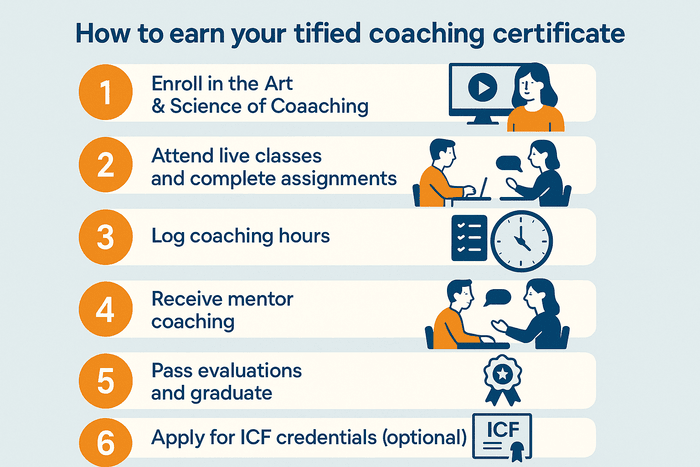
The coaching profession has moved from the margins to the mainstream. Recent global studies show that the number of professional...
The coaching industry has grown rapidly in recent years. Individuals and organisations seek support from coaches in areas like career development, relationships, wellness and leadership. However, the industry remains largely unregulated. Anyone can offer coaching services, which makes it challenging for clients to know who is qualified. That’s where a certified coaching certificate becomes invaluable. By completing a rigorous training programme and earning an accredited coaching credential, you demonstrate that you adhere to professional standards, possess core competencies and abide by a code of ethics. These factors reassure clients and employers that you are equipped to facilitate meaningful change.
For aspiring coaches, the process of obtaining your coaching credential provides structure and support. It guides you through a comprehensive curriculum that teaches effective coaching techniques, communication skills, business development and ethical practices. The journey typically includes live instruction, supervised coaching practice and assessments. Along the way, you’ll receive feedback from experienced mentor coaches who help you refine your skills. At the end of your training, you will receive a recognised certificate that signals your readiness to work with clients and organisations.
A certified coaching certificate is a credential awarded by an accredited coach‑training organisation to individuals who have successfully completed a set programme of study. These programmes cover the core competencies defined by professional coaching bodies, such as the International Coaching Federation (ICF). Earning this formal coaching credential usually involves a combination of classroom hours, mentor coaching, practical experience and evaluation. The certificate verifies that you have met specific standards and can practise coaching safely and effectively.
The ICF offers three levels of professional credentials: Associate Certified Coach (ACC), Professional Certified Coach (PCC) and Master Certified Coach (MCC). To apply for these credentials, you must first obtain an accredited certified coaching certificate from a recognised training provider. Each ICF credential requires a different number of training hours and coaching experience. For example, the ACC requires at least 60 hours of training and 100 hours of coaching practice. By completing a certified coaching certificate, you take the first step toward obtaining these internationally recognised designations.
It’s important to distinguish between a certified coaching certificate and shorter workshops or self‑study courses. While one‑off seminars can be valuable for professional development, they usually do not provide the depth or accreditation needed to qualify you for professional credentials. A proper certified coaching certificate ensures that you learn coaching ethics, theoretical frameworks, and practical skills. It also includes supervised practice, which is critical for developing confidence and competence. Only then are you ready to apply for an ICF credential.
When seeking a certified coaching certificate, you want to be sure that the training provider is reputable, accredited and aligned with your values. Erickson Coaching International stands out for several reasons. First, Erickson has been a leader in coach education since 1980. The organisation’s founder, Marilyn Atkinson, pioneered the Solution‑Focused Coaching model and has trained tens of thousands of coaches worldwide. Erickson’s programmes are accredited by the ICF, meaning that your accredited coaching certification from Erickson counts toward ACC, PCC and MCC credentials.
Erickson’s curriculum is comprehensive and experiential. Through live online classes, interactive exercises and mentorship, you will develop mastery of coaching skills while integrating them with your personal leadership style. Unlike some training providers that rely heavily on pre‑recorded content, Erickson emphasises live interaction. This ensures that you have ample opportunity to practise and receive feedback. The global cohort model also means you will study alongside participants from different cultures and professions, expanding your perspective and network. Upon completing the programme, you’ll receive an Erickson certified coaching certificate that is respected worldwide.
Another advantage of choosing Erickson is flexibility. Their programmes are designed for busy professionals. You can enrol in fully online cohorts, attend hybrid sessions or join in‑person classes in major cities. This adaptability allows you to earn your certified coaching certificate without putting your life or career on hold. Erickson also offers modular learning, so you can progress at a pace that suits you. Whether you complete your certified coaching certificate in six months or spread it over a year, you’ll receive the same quality education.
Finally, Erickson provides ongoing support beyond the initial training. Alumni enjoy access to mentorship, advanced courses and community events. This continued engagement helps you maintain the skills gained in your certified coaching certificate, stay current with industry trends and find collaboration opportunities. In a profession where relationships and credibility are paramount, belonging to the Erickson network is a significant benefit.
Obtaining a certified coaching certificate involves several steps, each designed to develop your competence and confidence. Here’s how the process works with Erickson:

Erickson’s certified coaching certificate programme is structured around the following modules:
These modules ensure that your learning journey addresses individual coaching, team coaching and organisational contexts. Each level builds on the previous one, reinforcing the knowledge and skills needed for a robust certified coaching certificate.
Earning a certified coaching certificate offers numerous advantages for both personal development and professional growth. First, it establishes credibility. Clients and organisations feel more confident working with a coach who has completed a formal programme and holds a certified coaching certificate. This trust leads to a stronger coaching relationship and increases the likelihood of referrals.
Second, holding a certified coaching certificate enhances your career prospects. Many employers require or prefer coaches who have formal credentials. Having a recognised certificate can lead to higher fees, more job opportunities and increased respect among peers. It also differentiates you from uncredentialed practitioners, signalling your commitment to excellence.
Third, the process of earning a formal coaching credential equips you with robust coaching skills that benefit many areas of life. You’ll develop active listening, empathy, critical thinking and goal‑setting abilities. These skills are valuable not only in professional coaching but also in leadership roles, personal relationships and community engagement.
Fourth, a certified coaching certificate connects you with a professional community. Through your training provider and credentialing body, you’ll gain access to networks, conferences and ongoing education. This network provides support, inspiration and collaboration opportunities. Staying engaged in the community ensures that you continue to develop after earning your certified coaching certificate.
Finally, obtaining a certified coaching certificate opens the door to ICF credentials. These international designations further validate your expertise and allow you to join a global network of professional coaches. As the coaching industry becomes more competitive, holding both a certified coaching certificate and an ICF credential will set you apart.
When you’re ready to pursue your certified coaching certificate, the first step is to speak with Erickson’s admissions team. They will help you select the right programme format and schedule. Because demand for certified coaching certificate programmes is high, it’s wise to plan ahead and secure your place early. You’ll then complete a registration form and choose your preferred payment plan.
Before your course begins, you’ll receive pre‑study materials, including recommended reading and self‑reflection exercises. These resources prepare you for the immersive learning experience and help you identify specific goals for your certified coaching certificate. During the programme, you will attend live sessions, participate in coaching practice and complete assignments. Erickson offers continuous support through mentors, peer groups and administrative staff to ensure you succeed in obtaining your certified coaching certificate.
If you are concerned about balancing training with other commitments, consider the flexible options Erickson provides. You can choose an intensive format that condenses the coursework into shorter timeframes or select a part‑time schedule that spreads the modules over several months. In both cases, the curriculum remains rigorous and ensures that your certified coaching certificate is of the highest quality.
Hearing from those who have completed their certified coaching certificate often provides motivation and inspiration. One graduate, a human resources professional from Gurugram, shared that the programme helped her transition into an organisational development role. She said that earning her certified coaching certificate not only taught her coaching skills but also gave her the confidence to lead change initiatives and facilitate challenging conversations. Her employer subsequently promoted her to head of talent management.
Another success story comes from a wellness practitioner who decided to earn a coaching credential to better serve her clients. She discovered that combining wellness expertise with formal coaching skills allowed her to support clients more holistically. After completing her certified coaching certificate, she launched a successful coaching practice and attracted a diverse clientele seeking both wellness and personal growth. Her business grew steadily as clients referred friends and family to her.
Internationally, graduates from Erickson’s programmes report similar outcomes. Many have used their certified coaching certificate to secure executive coaching contracts, transition into corporate training roles or start their own coaching businesses. The globally recognised Erickson brand and the credibility of a certified coaching certificate open doors that might otherwise remain closed. Graduates frequently cite the programme’s focus on ethics, personal growth and practical application as key factors in their success.
A certified coaching certificate is more than a piece of paper – it’s a testament to your dedication, competency and professionalism. In an industry where the barrier to entry is low but the expectations are high, obtaining this credential ensures you stand out. Erickson Coaching International provides a world‑class training programme that not only prepares you for certification but also equips you with a comprehensive toolkit for facilitating transformation. Whether you aspire to become a full‑time coach, integrate coaching into your leadership role or enhance your communication skills, earning a certified coaching certificate through Erickson will position you for success.
As coaching gains popularity across industries, the demand for well‑trained coaches continues to rise. Many organisations now embed coaching into their leadership development programmes and employee wellbeing initiatives. This trend has created diverse career paths for those who hold credentials. After completing your training, you may choose to join a consultancy, work as an internal coach within a corporation or launch your own independent practice. Coaches are needed in sectors ranging from education and healthcare to technology and finance. In addition to traditional one‑to‑one sessions, group coaching and team facilitation are growing specialties.
If you prefer entrepreneurship, you can build a practice tailored to your passions and expertise. Some practitioners specialise in executive development, while others focus on life transitions, wellness or career coaching. Developing a clear business plan will help you identify your niche, define your services and market effectively. Many successful coaches supplement their core offerings with workshops, online courses and speaking engagements. These additional streams of income can stabilise your revenue and expand your reach.
Another attractive opportunity lies in organisational development. Companies increasingly recognise the value of creating coaching cultures. They hire professionals to design and implement internal programmes, train managers in coaching skills and measure the impact on employee engagement. This type of work involves collaboration with HR departments and senior leadership, offering a unique way to combine coaching expertise with strategic thinking.
As you consider your future, remember that continuous learning and networking are crucial. Attend industry conferences, join professional associations and stay up to date with emerging research in psychology, neuroscience and business. Building a strong personal brand and maintaining a professional online presence can also attract potential clients. By investing in your growth and staying connected to the coaching community, you can create a thriving career that evolves with market needs.
Recent industry surveys show that the coaching market is valued at billions of dollars worldwide, with annual growth rates exceeding many other professional services. This growth is driven by individuals seeking personal development and corporations striving to improve employee engagement. As more companies adopt coaching as part of their leadership development strategies, job openings for skilled practitioners will continue to expand. In many regions, the income potential for experienced coaches rivals that of consultants and senior managers. Establishing yourself as a trusted professional requires dedication and ethical practice, but the rewards – both financial and personal – are substantial. When you help clients achieve their goals, you create meaningful change while building a sustainable business.
After completing your certified coaching certificate, continuous learning is essential. Erickson offers advanced courses in areas such as team coaching, leadership coaching and neuro‑linguistic programming. These programmes build on the foundation you established while earning your credential and expand your expertise. Joining professional associations and attending conferences also helps you stay current with industry trends and network with peers.
Consider joining peer coaching circles, where you can practise with other graduates and receive constructive feedback. These circles reinforce the techniques learned during your certified coaching certificate programme and provide a supportive community. You can also participate in webinars, podcasts and workshops hosted by coaching organisations to deepen your knowledge.
If you’re still deciding whether a certified coaching certificate is right for you, try attending an introductory workshop or free informational session. These events offer a glimpse into the coaching profession and provide an opportunity to ask questions. They can help you decide if investing in a certified coaching certificate aligns with your career goals and personal values.
Finally, remember that coaching is a practice. The more you coach, the more proficient you become. Keep a reflective journal, solicit feedback from your clients and continue to refine your approach. By honouring the standards and ethics you learned in your certified coaching certificate programme, you will build a reputation for excellence and attract clients who value your professionalism.
Although coaching is not regulated in most countries, clients and organisations prefer to work with coaches who have completed formal training. A certified coaching certificate demonstrates that you have mastered core competencies and follow ethical guidelines.
The timeline varies depending on the programme and your schedule. Erickson’s programme can be completed in six to twelve months. You’ll need to attend live classes, complete assignments and log coaching hours before receiving your certified coaching certificate.
A certified coaching certificate is awarded by your training provider, while an ICF credential is granted by the International Coaching Federation. The certificate verifies that you’ve completed a course, whereas the ICF credential demonstrates that you have met additional requirements such as coaching experience and passing an exam.
Yes. Erickson offers fully online cohorts with live instruction, interactive exercises and mentorship. You can earn your certified coaching certificate from anywhere as long as you have a reliable internet connection.
Far far away, behind the word mountains, far from the countries Vokalia and Consonantia, there live the blind texts. Separated they live in Bookmarksgrove right at the coast

The coaching profession has moved from the margins to the mainstream. Recent global studies show that the number of professional...

India’s economy has transformed dramatically over the last decade, and the demand for top business coach India services has grown...

When searching for a certified life coach program price, it’s natural to start by comparing tuition fees. Aspiring coaches want...

Neuro-Linguistic Programming (NLP) is experiencing a resurgence in India. Social media, workshops and high-energy seminars promise instant breakthroughs by rewiring...

Many professionals pursue the title of Certified Organizational Development Coach with the expectation that a credential alone will open corporate...

Some providers offer to fast-track you to PCC status through purely online modules for a fraction of the cost of...

Executive coaching has evolved from a niche service for struggling leaders into a strategic investment for organisations aiming to build...

When prospective coaches research training options, cost is often the first number they look for. A quick internet search produces...

Deciding to invest in life coach training programmes can be a transformative milestone in your personal and professional journey. In...